Interview by Alena Sokhan in Berlin; Thursday, Oct. 22, 2015
Recently we had a chance to speak with Siegfried Zielinski, a celebrated professor at the University of Art (UdK) and the European Graduate School, who is curating several exhibitions, authored over a dozen books and founded a new field of research – media archaeology. Zielinski is without a doubt one of the most lively and charismatic academics. He effortlessly discusses obscure lectures of Michel Foucault, cites his friend FM Einheit, percussionist and founding member of Einstürzende Neubauten, and talks with enthusiasm of thousand year old clocks. He has a deep appreciation for experimental and radical thought and himself constantly challenges the monotony of western culture – “I can’t stand this established academic discourse,” he tells me emphatically.
It is unlikely that he will ever run out of interesting things to say. I had encountered Zielinski before in Switzerland, and as soon as I walked into his office at the UdK he launched into an unprompted discussion about the political climate of Berlin, which led us along a winding conversation with many parentheses, punctuated by his gushing laughter.
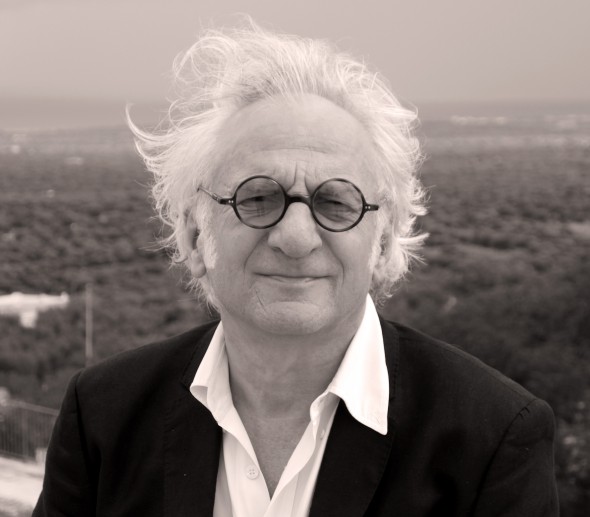 Image courtesy of Siegfried Zielisnki, photo by Mono Krom
Image courtesy of Siegfried Zielisnki, photo by Mono Krom
Siegfried Zielinksi: Berlin is not a place where things are happening: this city, even this continent does not have anything to offer at the moment. Things are happening elsewhere, in Latin America, particularly in Mexico, in East Asia, really the whole southern hemisphere, including Africa where humans started to walk, so to speak. Everyone that comes here from all over the world is looking for the Berlin of the beginning of the 90’s. It has changed, of course, completely. But more importantly, these kinds of constellations, like Berlin, are not the future for me.
Alena Sokhan: Why is that? Why does the West have no future?
SZ: At the moment, the West takes no risks in thinking and in constructing interesting possibilities. One of my tasks is to create spaces of potentiality, and right now I can’t see very much here. Of course the West is still very attractive because it is economically strong, and at the moment that is very important. But the West is still stuck in the concept of subjectivity and modernity, which had been founded in the 17th century.
After this next year, I will finish teaching at the University of the Arts, and then after over 40 years in Berlin, one of my plans is to go to Hong Kong. I have been thinking very much about the Pacific Area. I think this is where a lot will happen in the future.
AS: So what makes someone or some event have historical relevance to you? Does absolutely anyone have historical value and how do you decide what to study and what not to?
My biggest area of competence is in media, but this is a particularly interdisciplinary and experimental field of study. It is important to mention that I differentiate between media as a multifarious field of phenomenons and the Media as a system. For the study of media, experimental and interdisciplinary thought is crucial to understand the complexity of it, and for the study of the Media (the system) it is important to introduce alternative ideas. The world of the Media is highly standardized and lacks diverse ideas; the Media has become systemic now, it is no longer conducive to revolution.
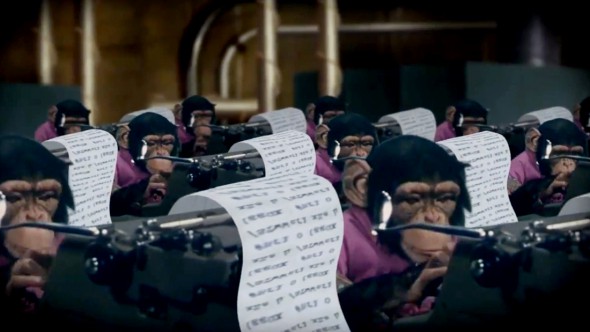 Cyriak Harris – “Chimpnology” (2014), film still; image courtesy of ZKM, copyright of Cyriak Harris
Cyriak Harris – “Chimpnology” (2014), film still; image courtesy of ZKM, copyright of Cyriak Harris
AS: From what I know about your work, you have developed a whole methodology for studying culture and history as a set of non-centralized intersections. Can you briefly explain ‘variantology’ and why you think it’s a better model than the normal linear model of history?
SZ: Perhaps I should start with anarchaeology, which was the term that preceded variantology. I was working in the late 1970s and early 1980’s on an archaeology of media, dealing with topics like the workers’ radio movements of the 1920’s, which was already completely out of date in the 1970’s. For me it was a very important topic of study because I saw strong resemblances between the radio movements and the video guerrilla movements around the world, and then later with the hacker movements of early internet culture. This example is very important for me, because it shows how an archaeological approach to history and to deeper time regions is always an attempt to deal with the future, and with what might come. We can only go back in the past to study what might come in the future. These first archaeological projects were time machines, sent to explore what has been and what might come, combining these two temporal dimensions.
At the beginning this archaeological research was very naive, and then I became more familiar with Michel Foucault and his work, and others of the French Poststructuralist tradition. I used archaeology more and more as a meta-method for my media research, though it was always somehow a little too linear for me, not dynamic enough, though Foucault was always addressing the necessity of moving though labyrinthian structures and encouraging multi-linearity (he did not use these terms, but the idea is there).
So I tried to develop for myself some small alternatives. At the beginning of the 90’s, I began using the term anarchaeology, and of course everybody was irritated but I liked this irritation. Anarchaeology implies that the things that we are investigating in the past are much freer and much looser, and much less linear than we think. So we have to let them them go and see how they develop.
People immediately associate the term with political anarchism, and after a while I realized I wanted a more constructive concept. I returned to the starting point of my research, and realized that what I wanted to do was to challenge technology through poetic thinking and acting. Technology has a tendency towards standardization and universalization, so in confrontation with technology, I want to create different alternatives. I wanted to invite variance into my research, to assemble a variety of ideas and concepts. That is where the strange term ‘variantology’ emerged – it is a variant to the universal standard.
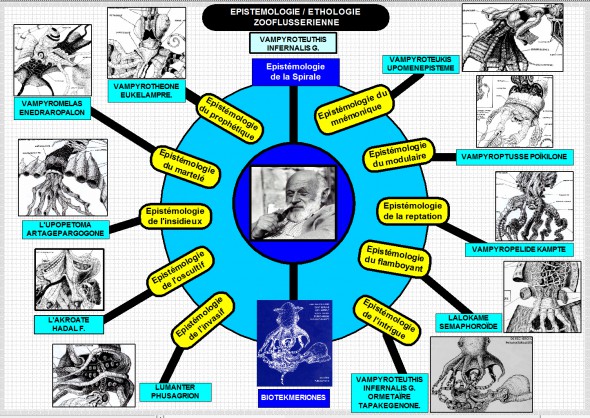 Louis Bec – “Institut Scientifique de Recherche Paranaturaliste” (1972–2015), Detail of the installation; image courtesy of ZKM, copyright of Louis Bec, Zoosystémicien and the Vilém Flusser Archiv, Universität der Künste Berlin
Louis Bec – “Institut Scientifique de Recherche Paranaturaliste” (1972–2015), Detail of the installation; image courtesy of ZKM, copyright of Louis Bec, Zoosystémicien and the Vilém Flusser Archiv, Universität der Künste Berlin
When you read art history and media history you know that there are many many concepts, histories, and ideas that were competing with each other, though with pervasive processes of industrialization and capitalization, this multitude of concepts becomes homogenized into one history. With deep time research, I send a time machine into the past to see how all these variations spread out, collide and develop, and I hope that some of this energy and variety can be taken through the present and into the future, to be made fruitful for the future.
The past is mainly what we make of it, how we interpret and define it. When we look at the future we want an open future, we want the future for us to be full of possibilities, to be full of options, of potentialities, but we don’t allow the past to be the same. Of course, I am not trying to deny the past or the reality of history… this is not the point. I know that there are many phenomenon in the past that can be interpreted and constructed in a way that they can be made fruitful for the future. My deep hope is that the same demand that we have for the future, that it must be a space of open potentiality, can be projected into the past.
AS: Can you give an example of a project of variantology?
SZ: A project I am working on at the moment is an exhibition called Allahs Automata, which is about the automatons built in the Arab World between 800 and 1200. Few people are aware that in this period there was a very rich ‘scientific’ and artistic culture (as we would call it now) of highly developed engineering and experimental research, in the whole Mesopotamian world, and, of course, in Andalusia and in other parts of the Islamic Empire. So when we gather research on this era and interpret it again we have a completely different image of Islamic culture than the popular image at the moment of the recent events in Syria and Lebanon. I am working on this project with people from Syria and Lebanon and this is a very important aspect as well.
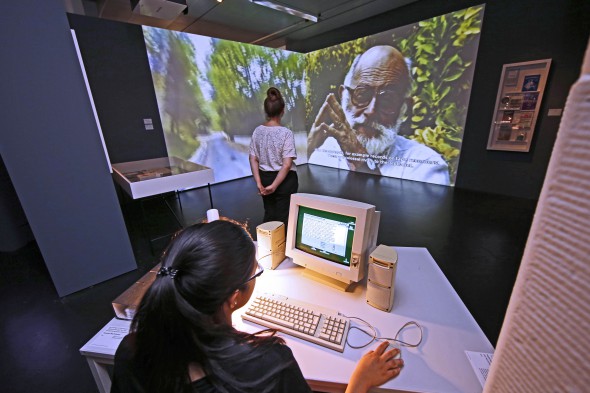 “Bodenlos – Vilém Flusser und die Künste”, exhibition view; image copyright of ZKM, photo by ONUK
“Bodenlos – Vilém Flusser und die Künste”, exhibition view; image copyright of ZKM, photo by ONUK
AS: How do you maintain an ethical relation to studying and relating non-Western cultures – for instance, East Asian and Arabic traditions – into Western culture, without imposing something onto them in the process of study?
SZ: It has to be a real dialogue with other cultures, and you have to be extremely careful that you are not imposing what you know from Western philosophy. In reality, it is absolutely necessary that we engage with other cultures. Right now the West lives with a very narrow perspective on the world and when we go deep into the layers of the past we can observe that there is a tremendous richness and variety in other cultures that we have no idea about. Deep time is not about simply finding something old in the new. The deeper I go vertically into the past the more I realize I have to expand horizontally, to look at other cultural spheres.
For example, when I go to Hong Kong, I will try to realize a project that I have been working on for some time, about winds and navigation. Winds have been extremely important in the past in distributing knowledge, goods, and culture since sailing ships were the most important instruments of transportation. I am convinced that in the future we will have to learn once again how to read winds and how to deal with them.
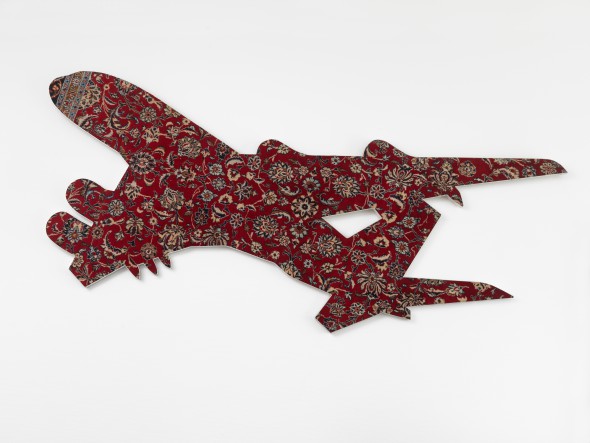 Alex Fleming – “Flying Carpet” (2005); courtesy of Alex Fleming and ZKM, copyright of the artist
Alex Fleming – “Flying Carpet” (2005); courtesy of Alex Fleming and ZKM, copyright of the artist
I think that you could only do such a project on winds and on navigation with people from the Pacific and oceanic areas, who are in contact with the world seas, and not this little province that is located around the Mediterranean. It is simply imperative that we look to other cultures for this topic of research, and it shows how short-sighted Western philosophy is. Emanuel Kant from East Prussia, the noblest thinker of Cosmopolitanism in the German history of philosophy, physically never went more than a few miles from his birthplace Königsberg. His entire life he circled around the navel of his place of birth. Hegel never saw the sea, though he wrote about the Mediterranean and even emphasized its geopolitical function, using what he read in some travel memoirs. He had no idea what the sea was really like; he never smelled the sea. Then how could he imagine the world or write anything about it?
In this generation, many young people and students do not belong to any nation or territory anymore. They are born in one place, grow up in another, study in yet another and so on. This is quite different from the 19th century, so we need different forms of thinking.
AS: Do you think this loss of home and foundation is a problem? Are people too scattered, too uprooted?
SZ: I don’t think so. I think home is very subjective. I learned from Vilém Flusser that home is very problematic and to lose your home can also be a form of liberation. By losing your home you can start anew, and you have a different kind of world experience. Home is not defined by origins or territory anymore, it can be a good book, a dialogue, a familiar activity, a collaborative project. This sounds very poetic, but that’s where new ideas come from. We have to develop new concepts, and it might help with this idiotic political situation which we are in at the moment. We are still thinking with the old concepts of home, Heimat, borders, and so on, and there are few attempts to think beyond that. We cannot demand this of politicians because it’s not their responsibility to think in this way. We as intellectuals, artists and other people, who are able to listen to their free will, have to develop new ideas.
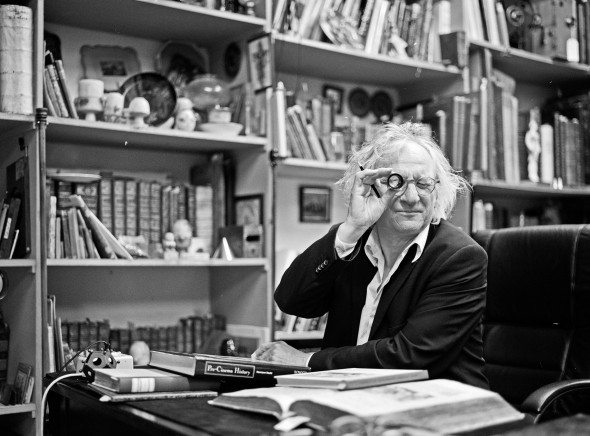 Image courtesy of Siegfried Zielinski, photo by Mono Krom
Image courtesy of Siegfried Zielinski, photo by Mono Krom
___________________________________________________________________________________
Additional Information
AKADEMIE DER KÜNSTE
“Bodenlos – Flusser und die Künste”
Exhibition: Nov. 19, 2015 – Jan. 10, 2016
Opening reception: Wednesday, Nov. 18, 2015; 5 PM
Hanseatenweg 10 (click here for map)
ZKM KARLSRUHE
“Allahs Automata”
Exhibition: Oct. 31, 2015 – Feb. 28, 2016
ZKM-Karlruhe; Lorenzstraße 19 (click here for map)
__________________________________________________________________________________






















